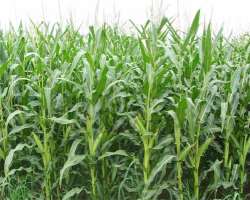NEPAD AND AGRICULTURE, AFRICA'S DEVELOPMENT PLAN BEARS FRUIT

For most of the 1990s Sierra Leone was best known for its diamonds — and the devastating civil war they helped finance. But a decade after the end of that conflict, the West African nation is tapping a different kind of wealth: the crops that grow on its fertile land. All that was needed, said Marie Kargbo, who cultivates rice on a six-hectare farm in Kambia district in northwestern Sierra Leone, was a little help: “Before now, life for women farmers was very difficult,” she told a reporter for the Inter Press Service news agency. “But now rice production has been fruitful, as we have been receiving supply from the government, ranging from seed rice [to] power tillers, fertilizers and pesticides.”
In 2009, according to the latest UN estimates, Sierra Leone grew 784,000 tonnes of rice, well above the 550,000 tonnes needed for domestic consumption and a third higher than in previous years. The reason, most people agree, has not been agricultural so much as political. In 2008 President Ernest Bai Koroma declared that, after energy, agriculture would be his administration’s highest development priority.
The government put money behind that talk by increasing agriculture’s share of the 2009 budget to 7.7 percent, a dramatic leap from the 1.6 percent allocated the previous year. The 2010 budget pushed up the share further, to 10 percent.
With that step, Sierra Leone became just one of a dozen African countries to reach the target for agricultural spending recommended by African governments in Maputo, Mozambique in 2003. That summit also approved a detailed plan for African agriculture known as the Comprehensive African Agricultural Development Programme (CAADP), which is part of the New Partnership for Africa’s Development (NEPAD), the African Union’s continental development programme.
An agricultural revolution
Through increased investment, better agricultural policies and more support for Africa’s farmers, the continent can achieve an agricultural revolution, says Ibrahim Assane Mayaki, the chief executive officer of the NEPAD Planning and Coordination Agency. “Africa has the potential to become a major food producer, ensuring food security on our continent and beyond.”
Boosting production is not only vital for reducing hunger in Africa, notes the CAADP programme, “but it also makes economic sense.” In virtually every African country agriculture constitutes the backbone of the economy. Yet for decades African agriculture suffered from neglect. Many governments devoted only a minuscule percentage of their budgets to farming, and, despite promises, donor funding remains scarce. .That makes it even more important for African governments to do their part, argues Mr. Mayaki. “We all have to make the necessary funding available. We need to increase our levels of investment into agriculture in Africa.”
Dodoma, Tanzania
Farming for development: a farm in Dodoma.
Credit: UN Photo/B Wolff.
Agricultural ‘compacts’
Yet by 2007 only eight African governments were devoting 10 per cent or more of their budgets to agriculture. That year, Rwanda became the first country to sign a formal CAADP Compact. Under it the ministers of finance and agriculture vowed to increase the share of government spending for agricultural development from 4 per cent to more than 10 per cent within five years. By late 2010, 22 African governments had signed compacts, with another six expected to sign later this year. Most governments subsequently hold consultations with farmers’ organizations, technical experts, researchers, donor officials, business representatives and others to develop detailed, multi-year investment plans.
More inputs equal bigger harvests
But the real test is whether those funds reach farmers on the ground. In country after country, experience has shown that farmers’ access to fertilizer, high-yielding seeds and irrigation can be crucial in boosting their harvests.
In 2009 Mozambique distributed 7,300 oxen as part of a programme to expand the use of animal traction, a measure that should enable families to cultivate at least five hectares each, instead of one. That same year Uganda recorded its best-ever maize harvest. “We distributed enormous quantities of good-quality high-yielding seeds,” explained Opolot Okasai, the government’s commissioner for crop resources. In 2010, thanks to the programme the maize harvest was even higher, nearly twice domestic consumption needs.
In Tanzania, greater use of hybrid seeds and fertilizers enabled farmers to produce a surplus rice crop in 2010. That same year Senegalese rice farmers, who generally produce only about 150,000 tonnes annually, were able to grow 350,000 tonnes, about half the country’s rice consumption. In addition to more seeds and fertilizer, a well-funded farm irrigation programme proved decisive.
Particular care must be taken that such assistance reaches women farmers, experts point out. Whether governments provide seeds, fertilizers, marketing assistance or credit, they “must give the necessary support to the women farmers, who produce the majority of Africa’s food,” says Namanga Ngongi, president of the Alliance for a Green Revolution in Africa, a non-governmental rural development initiative.
More generally, farmers’ groups must gain a greater voice in helping to set agricultural policies and programmes, Mr. Mayaki, the NEPAD chief executive, said at the first Pan-African Farmers Forum, held in Malawi in October 2010. The participants included representatives of national farmers’ unions and five regional farmers’ organizations. “Farmers,” Mr. Mayaki said, “have an important role in ensuring the good application of the NEPAD fundamentals — transparency, accountability and local ownership.”
Written by Ernest Harsch.
